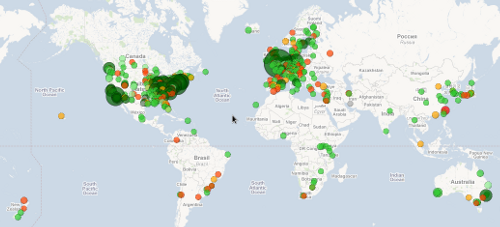You are, of course, familiar with the five classic senses: vision, hearing, smell, taste and touch. But when you take an elevator you can readily feel that this list is incomplete. The queezy sensation that you get in an elevator is largely due to our vestibular system, which provides us with a sense for balance and acceleration. We also have relatively distinct senses for pain, temperature, various aspects of our internal organs (interoception) and the position of our body (proprioception). But even more interesting, I think, are those senses that are completely alien to us, specialized senses that are found only in a few species of animal.
![A bat getting a treat (Source: [url=http://commons.wikimedia.org/wiki/File:Bat_flying_at_night.png]Wikimedia Commons[/url])](/images/stories/blog/animals/bat.png) The philosopher Thomas Nagel famously wondered what it's like to be a bat (Nagel, 1974). Although being a bat must be very different from being human in a lot of ways, Nagel referred specifically to the bat's sense of echolocation, which, he felt, is so different from anything that we can experience that we can only guess how a bat perceives the world. And he has a point. Unlike nocturnal birds, which simply have very sensitive eyesight, bats listen to the echoes of their screams (too high for us to hear) to navigate through the dark. The idea behind echolocation is pretty simple: The delay between the scream and the echo tells the bat how far away an obstacle is. If the echo is heard first with the left ear, the object is on the left. And more subtle clues, such as how …
The philosopher Thomas Nagel famously wondered what it's like to be a bat (Nagel, 1974). Although being a bat must be very different from being human in a lot of ways, Nagel referred specifically to the bat's sense of echolocation, which, he felt, is so different from anything that we can experience that we can only guess how a bat perceives the world. And he has a point. Unlike nocturnal birds, which simply have very sensitive eyesight, bats listen to the echoes of their screams (too high for us to hear) to navigate through the dark. The idea behind echolocation is pretty simple: The delay between the scream and the echo tells the bat how far away an obstacle is. If the echo is heard first with the left ear, the object is on the left. And more subtle clues, such as how …



![An octopus opening a container with a screwcap. (Source: [url=http://commons.wikimedia.org/wiki/File:Oktopus_opening_a_container_with_screw_cap_03.jpg]Wikimedia Commons[/url])](/images/stories/blog/animals/octopus.jpg) But then there is the octopus, the nerdy cousin of the snail. Octopuses
But then there is the octopus, the nerdy cousin of the snail. Octopuses 


